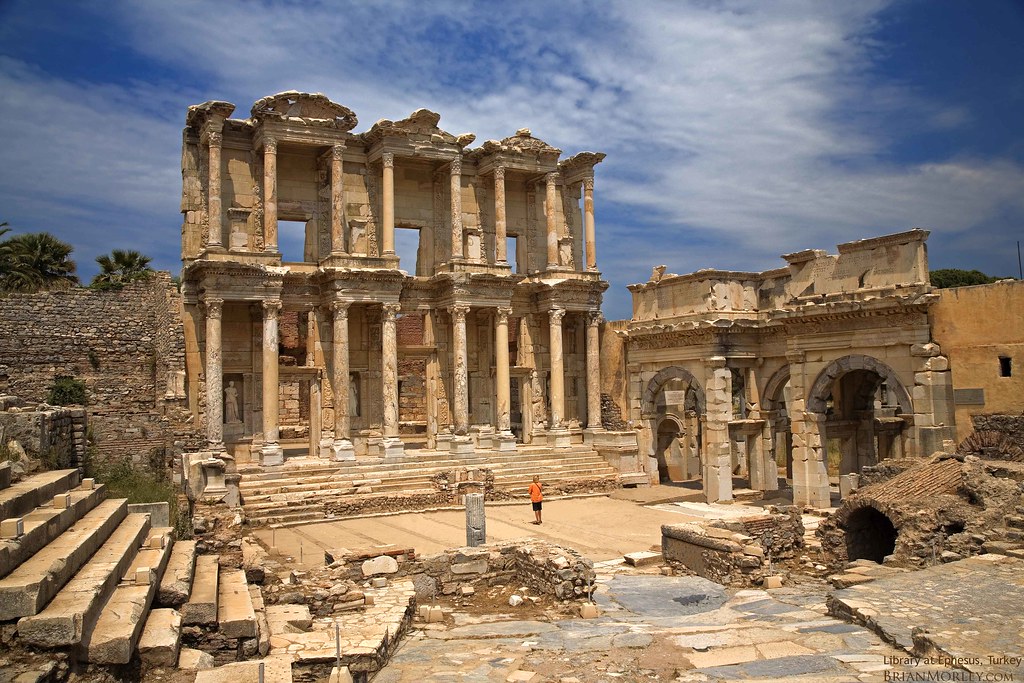
Modern-day tourists walking in the steps of the apostle Paul can still reach out and touch the spectacular ruins of a trio of ancient cities.
In three consecutive chapters – Acts 17-19 – the Bible documents Paul’s missionary experiences in Athens, Corinth, and Ephesus. Each city had a patron Greek goddess, and the identity of each community was fashioned according to the strengths and weaknesses of its particular mythological deity.
Paul first went to Athens. If you’re trying to imagine a contemporary equivalent, think Boston.
Even though the Golden Age of Greece was 400 years in the rear view mirror by the time Paul arrived, Athens still pictured itself as a cultural trendsetter. The Good Life came down to the right people cultivating the right ideas. The city was famous for its philosophers and the stunning marble temples of the Acropolis. Its civic leaders, to put it bluntly, were the stuffed shirts of the first century. The goddess to whom the city was dedicated was Athena – the Greek embodiment of wisdom. How would Paul fare against the self-described smartest people in the world?
Paul next traveled to Corinth, where the Good Life was centered around good times. Think Las Vegas. We’re still expecting an archeologist to uncover an engraving that says, “What happens in Corinth, stays in Corinth.”
Corinth was a bustling business center, sailor’s town, and full-time Party Central. Its patron deity was Aphrodite, the goddess of love. One thousand cult prostitutes were employed at her temple, which was situated at the top of a high hill. At dusk they would descend into the city to ply their trade. It’s worth noting that whenever a Greek play included a character from Corinth, that actor was portrayed as drunk. How will a straight-lace Jew like Paul function in an environment like Corinth?
Paul next crossed the Aegean Sea to the metropolis of Ephesus, which was a hotbed of diverse spiritualities. Think San Francisco with Shirley MacLaine as mayor.
Ephesus (whose ruins are pictured above) was dedicated to the worship of Artemis, who was portrayed locally as the earth mother goddess. Her spacious temple was one of the Seven Wonders of the ancient world. The Good Life included easy access to horoscopes, potions, magic spells and alternative lifestyles. What will Paul have to say to people with New Age sensibilities?
Athens proves to be a tough nut to crack.
Paul ventures into the marketplace, trying to win a hearing for Jesus. “A group of Epicurean and Stoic philosophers began to dispute with him. Some of them asked, ‘What is this babbler trying to say?’ Others remarked, ‘He seems to be advocating foreign gods.’ They said this because Paul was preaching the good news about Jesus and the resurrection.” (Acts 17:17-18)
The Greek word translated “babbler” is actually “seed-picker.” This is Athenian slang for someone who, like a bird, picks up bits and pieces of this and that and tries to patch together a new way of seeing things. Notice that Paul’s audience assumes he isn’t promoting God (singular), but gods (plural). They apparently believe he’s advocating a male god named Yesous (Jesus) and a goddess named Anastasia (the Greek word for resurrection). So far this is not going particularly well.
But Paul manages to build some bridges. Even though most of the philosophers shrug and walk away, a few feel powerfully drawn to this new message.
Things go better in Corinth, where Paul ministers for 18 months and establishes a large (if unruly) new congregation. And he spends more than two years in Ephesus, where followers of Jesus will thrive for centuries.
So, Paul stands in the presence of the smartest people in the world and says, “You’ve overlooked the most important aspect of reality.” He walks into the Party Zone and declares, “There is so much more to life than feeling good.” And he sits down in the lounge of religious relativism and says, “Let me tell you about Someone who is more than just another option on the spiritual smorgasbord.”
But one of his greatest successes, which tends to be overlooked, comes in the Macedonian town of Berea, one of those places you would visit chiefly because you were on your way to somewhere else.
These days only a few tourists visit what remains of ancient Berea. There are no impressive ruins to explore. We actually know very little about this community.
But we do know that the Bereans’ search for the Good Life took them down a very different path. When Paul and his partner Silas arrive in Berea (on their way to somewhere else), “they went to the Jewish synagogue. Now the Bereans were of more noble character than the Thessalonians, for they received the message with great eagerness and examined the Scriptures every day to see if what Paul said was true.” (Acts 17:10-11)
Today, if someone calls you a Berean, you are being paid an extraordinary compliment.
A Berean is someone who does her homework. Who thinks for himself. Who isn’t content to hitchhike on someone else’s convictions. Who wrestles, searches, and struggles with the enduring questions associated with the meaning of life.
When you think about your future, do you ever hope that one day you might “be somebody”?
Be a Berean.
It’s never too late to embrace the life-changing habit of studying God’s Word.
